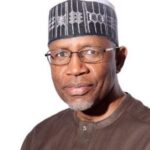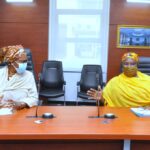Nigeria, on behalf of Angola and South Africa Constituency, has called for global solidarity in upgrading the digital space in Africa so that the continent can benefit from new jobs.
Mrs. Zainab Shamsuna Ahmed, Honorable Minister of Finance, Budget and National Planning, speaking virtually at the International Monetary Fund (IMF)/World Bank meeting, said: “Assuming a strong recovery in 2021 full year (FY21), most of the current jobs may not return, while new jobs will be created. We, therefore, call for global solidarity in upgrading the digital space in Africa so that the continent can benefit from the new jobs.”
According to her, when the World Development Report on Jobs was published in 2013, with emphasis on new nature of jobs, a deep global shock such as COVID-19 pandemic was not envisaged. Today, the International Labour Organisation (ILO) estimates that within the first three quarters of 2020, labor income losses are estimated to be US$3.5 trillion or 5.5 percent of global GDP.
“We seek new investments in broad band network, technical and vocational skills, as well as hard infrastructure, including access to energy, that can drive the digital transformation process in Africa and ensure the realisation of the jobs and economic transformation agenda,” she stated.
“We commend the Bretton Woods Institutions (BWIs) and the G20 Leadership for the debt service suspension initiative (DSSI), and support calls for its extension, as well as participation of all commercial and bilateral creditors. However, the associated flows from the DSSI may not sustain the massive financing needs of countries. We encourage more attention to debt management and domestic resource Mobilisation.
Shedding some light on Progress Report on the 2020 International Bank for Reconstruction and Development (IBRD), among others, Ahmed further stated: “We welcome the Progress Report on the 2020 IBRD and International Finance Corporation (IFC) shareholding reviews and continue to support the gradual adjustment of membership shareholding in the World Bank Group (WBG), to address the underrepresentation of members.
“However, given the need for encashments of recently approved IBRD and IFC Subscriptions, as well as the constrained fiscal environment, due to the COVID-19 pandemic, adjustment this time is not advised.
She joined her colleagues to thank David Malpas, World Bank Group (WBG) President and his team for his strong leadership and the swift way the World Bank and the IMF have rolled out knowledge, technical and financial products to support member countries in the fight against the deadly corona virus and its devastating effect.
Highlighting the issues of trade tensions and the impact on subdued global growth, the Honourable Minister said: “Last year, we were concerned about trade tensions and the impact on subdued global growth. Today we are faced with a tripartite tension triggered by COVID-19: Loss of lives and livelihoods; trade and value chain disruptions and a deep global recession. In all these, Africa remains the hardest hit, with its GDP estimated to contract by three percent, according to the IMF, as our countries entered this pandemic with limited fiscal space to withstand shocks, weak social security systems to aid resilience, and limited infrastructure to support return to normalcy.”
“The support of the World Bank and the global community towards the health needs of many of our countries, have been welcomed and remain critical. We, therefore, commend the World Bank for the additional financing of $12 billion and commitment to work with the global community towards a timely affordable and equal access to vaccines for developing countries.
Given the huge financing gap that exist to support the recovery of African economies, “we share concerns on the capital adequacy of the WBG institutions. In this regard, we urge all stakeholders to work together and ensure that development association (DA) has enough resources to help the poorest and most resource- constrained members of the WBG.






